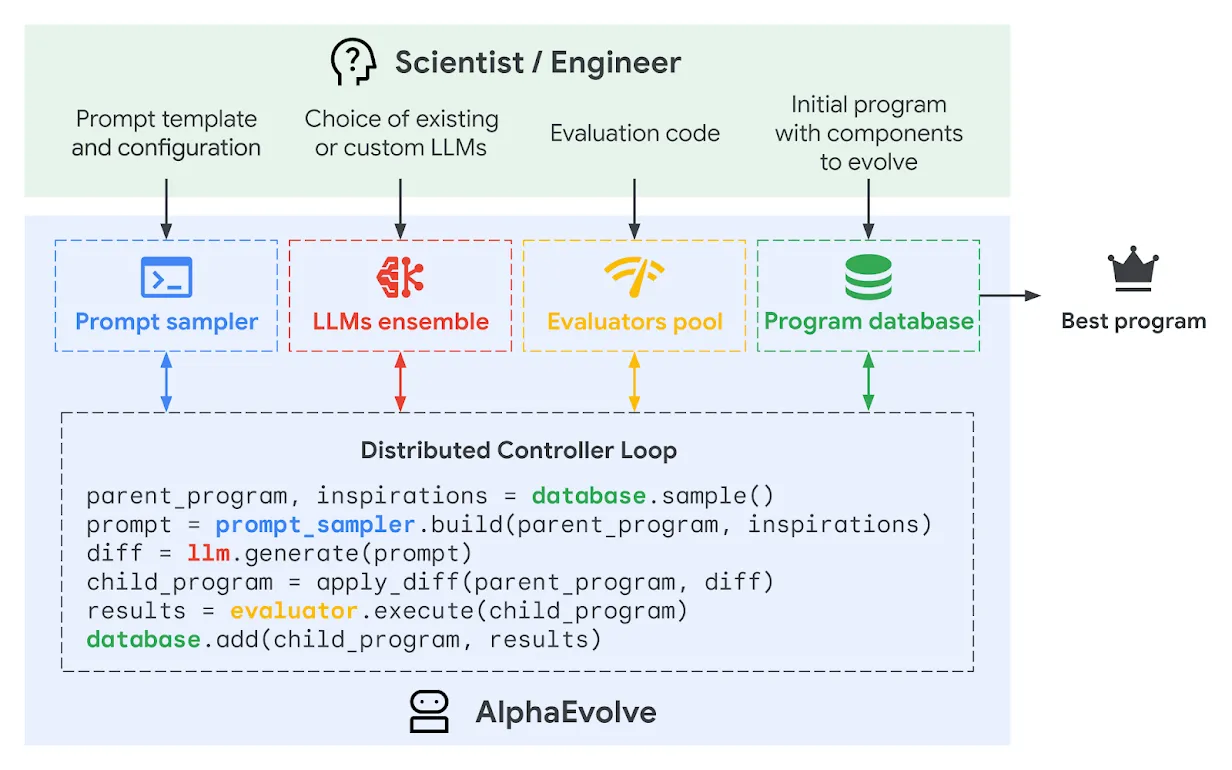
DeepMind has a new AI system that writes code—not just to build apps, but to solve math problems, optimize Google’s own hardware, and even speed up the training of AI models like itself. It’s called AlphaEvolve, and it might just be the most recursive thing Google’s ever made.
Key Points
- AlphaEvolve evolves entire algorithms using Gemini models and automatic scoring.
- It’s already in use optimizing Google’s AI infrastructure, chips, and scheduling systems.
- Early access is coming for academics, hinting at broader deployment soon.
AlphaEvolve combines the creative fluency of its Gemini large language models with a ruthless evolutionary loop and automated scoring. The result is a coding agent that improves itself—and the systems it runs on—with each generation.

AlphaEvolve is already doing real work across Google’s empire. It found a better scheduling heuristic for Borg, the system that orchestrates data center compute, recovering an average of 0.7% of resources that would’ve been stranded. It also proposed hardware-level improvements to TPU circuits, sped up matrix multiplication kernels by 23% (cutting Gemini’s training time by 1%), and shaved 32.5% off GPU runtimes for Transformer models by optimizing compiler-generated code—something even expert engineers rarely attempt.
Unlike its predecessor AlphaTensor, which was built to find faster matrix multiplication routines, AlphaEvolve is a generalist. It works on anything that has a “machine-gradeable” objective: mathematical bounds, combinatorial structures, search heuristics, or low-level code that needs to go faster. It takes a user-defined program and evaluation function, then iteratively mutates, scores, and evolves it using an ensemble of Gemini Pro and Gemini Flash models. Think of it as a turbocharged, feedback-driven code optimizer that actually understands what it’s trying to improve.
In internal tests, AlphaEvolve improved the state of the art on 14 matrix multiplication benchmarks, including a long-standing open problem from 1969, and made advances in over 20% of the 50+ open mathematical problems it was tested on. One of the most impressive? It found a new lower bound for the kissing number in 11 dimensions—a brain-twisting geometry puzzle that’s stumped mathematicians for centuries.
This blend of symbolic reasoning and concrete verification is what sets AlphaEvolve apart. While many LLM-based agents are still stuck hallucinating half-plausible solutions, DeepMind’s system can actually run the code it writes, measure outcomes, and mutate based on performance. The ability to apply this loop across domains—from packing circles to scheduling data centers—hints at a versatile new paradigm for applied AI research.
AlphaEvolve is also recursively useful: it’s optimizing Gemini, which powers AlphaEvolve. While the gains are still modest, they point toward a feedback loop where AI helps make better AI, faster. DeepMind is betting that this structure—evolving code in response to direct, quantitative feedback—can scale, and maybe even become a core pillar of scientific discovery.
The next step is to open it up. DeepMind says it’s building a user interface and launching an early access program for select academic researchers. While there’s no timeline yet for public release, the promise is clear: an AI collaborator that can brainstorm ideas, implement them as code, and prove they work—all at machine speed.
Or as DeepMind puts it: AlphaEvolve is for any problem that has a solution you can describe as an algorithm and verify automatically. In other words, it’s not just automating answers. It’s evolving the very questions we can ask.
